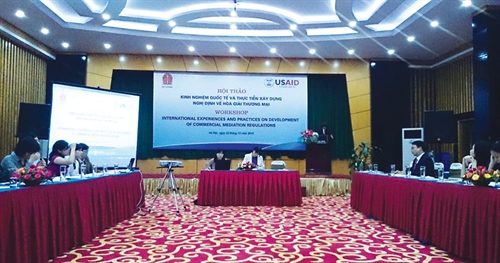Bui Duc Giang
Attorney at law and PhD in law [1]
Guarantees are the most common type of personal security recognized by the general law of security. Security is notably used in the context of corporate financing. Civil Code No. 91/2015/QH13 dated November 24, 2015 (the Civil Code) contains various new rules on this security interest. This article is confined to an overview of guarantees from practice, dealing with suretyship guarantee which denotes a guarantee triggered by default on the part of the principal debtor, by way of contrast to (first) demand guarantee which denotes an independent undertaking to pay as widely used in international commerce.
New provisions
Article 336.3 of the Civil Code officially recognizes that the parties may agree that the guarantor’s liability is secured by a security interest on property. The most common scenario is that the guarantor creates a charge or pledge over his assets to secure his liability.
A guarantee is an accessory contract, not a primary contract (Article 407.2 of the Civil Code).
Furthermore, Article 336.2 of the Civil Code expressly indicates that the guarantor’s liability also applies to late payment interests in addition to secondary liabilities for damages and penalties.
Article 336.4 prescribes that “in case the guaranteed obligation is an obligation arising in the future[2], the scope of the guarantee does not include any obligations arising after the individual guarantor’s death or the corporate guarantor’s cessation of existence”. A corporate guarantor may cease to exist in case of its dissolution, bankruptcy or transformation.
It should be noted that Article 341.1 of the Civil Code provides that “where a guarantor is required to perform his liability which the beneficiary discharges the guarantor from performing, the principal debtor will not be required to perform the obligation towards the beneficiary, unless otherwise agreed by the parties or otherwise provided by law”.
 |
| Nestor Scherney, Senior Advisor to the Vietnam Trade Facilitation Alliance, introduces the Customs Bond System, which will be applied in the country on a trial basis from 2019 at a conference held in Ho Chi Minh City on September 6__Photo: Xuan Anh/VNA |
Nature of the guarantor’s undertaking
Article 335.1 of the Civil Code defines “a guarantee means an undertaking made by a third person (the guarantor) to a creditor (the beneficiary) to perform an obligation in lieu of the debtor (the principal debtor) if the obligation becomes due and payble and the principal debtor fails to perform or improperly performs it”.
This definition implies that the beneficiary may only request the guarantor to perform the guaranteed obligation in lieu of the principal debtor in case the latter breaches this obligation. This rule has been reiterated in Article 342.1 of the Civil Code under which “where the principal debtor fails to perform or improperly performs the obligation, the guarantor shall perform such obligation”.
Furthermore, Article 339.2 of the Civil Code provides “the beneficiary may not request the guarantor to perform the obligation in lieu of the principal debtor if such obligation has not become due and payable”. Reading these provisions together, it can be inferred that the guarantee can only be called if:
• the guaranteed obligation has become due and payble; and
• the principal debtor has breached it.
Article 335.2 of the Civil Code expressly prescribes that “the parties may agree that the guarantor shall perform the obligation in lieu of the principal debtor only if the principal debtor is unable to perform it”. This means that unless otherwise agreed by the parties, if the guaranteed obligation becomes due and payable and the principal debtor breaches it, the beneficiary may call the guarantee without having to provide the guarantor with evidence that the principal debtor has no (financial) ability to perform it. In case a parent company acts as guarantor for its subsidiary’s loan, the bank may find it better to call the guarantee than to enforce other security on the subsidiary’s property since the parent company is usually in a better financial position than its subsidiary.
As for the guarantor’s liability, under Article 342 of the Civil Code, “where the principal debtor fails to perform or improperly performs the obligation, the guarantor shall perform such obligation. Where the guarantor fails to perform properly his liability, the beneficiary will have the right to request the guarantor to pay the value of the breached obligation and compensate for any damage caused by the breach”.
The nature of the guarantor’s undertaking as analyzed above shows that the guarantee is quite efficient for banks. Unfortunately, the current law is lacking efficient guarantor protections.
Enforcement
Given the nature of the guarantor’s undertaking, a lender’s rights to enforce a guarantee will, as mentioned above, not arise until the principal debtor has defaulted in the performance of the guaranteed obligations. In the absence of explicit provisions in the guarantee document itself, the liability of the guarantor will arise immediately on the principal debtor defaulting, but not earlier.
The terms of the guarantee document may require certain additional formalities to be completed when a claim is made under the guarantee. For example, there may be a requirement (and this is usually the case) to serve a formal demand on the guarantor (and possibly the principal debtor). Any such provisions are generally viewed by the courts as conditions precedent to liability and will be interpreted strictly to the benefit of the guarantor.
There is no general law requirement that the lender takes enforcement action against either the principal debtor (e.g. by enforcing a security interest over his property) or any other guarantors before claiming under a guarantee.
Co-guarantors
Pursuant to Article 338 of the Civil Code, “when more than one person guarantee an obligation, those persons shall perform jointly and severally the guarantee, except where it is agreed or provided by law that the guarantee comprises separate portions. The creditor may demand one of the co-guarantors to perform the obligation in its entirety”.
As such, co-guarantors are deemed to be jointly and severally liable for the guaranteed obligation unless the law provides for or the parties agree on sharing of the common liability. In the latter case, guarantors are said to be severally liable only.
Under Article 341.2 of the Civil Code, where a guarantee is expressed to be “joint and several”, and only one of the co-guarantors is released from liability, the remaining co-guarantors will remain liable to the extent of their liability. In such case, if the lender simply agrees not to sue a co-guarantor, the remaining guarantors will continue to be liable to it.
A guarantor may claim contribution from other guarantors of the same obligation. A claim can be made if a guarantor pays in full all of the principal obligations which have been guaranteed (Article 338 of the Civil Code). The Civil Code is unclear on whether a claim may be made if the guarantor pays more than its share of those obligations, that is, the amount it would have been required to pay if all guarantors had contributed in the required shares to the payment of the guaranteed obligations.
It is possible to modify or exclude the right of contribution expressly by agreement between the guarantors. For instance, by agreeing that one guarantor will be liable for a specified amount or percentage of the guaranteed obligations and that the other guarantor or guarantors will be liable for satisfying any claim made in respect of the guaranteed obligations over that limited amount.
Termination
Article 343 of the Civil Code enumerates four types of case in which a guarantee may terminate, including (i) termination of the guaranteed obligation, (ii) cancellation of the guarantee or its replacement by another security interest, (iii) completion of the performance of the liability by the guarantor, and (iv) by agreement between the parties.
The first ground for termination is based on the principle that the guarantor’s obligations are co-terminous with those of the principal debtor. The guaranteed obligation may terminate for various reasons, for instance once the principal debtor has fulfilled this obligation, or the beneficiary released the principal debtor from it, or in case of recission (and more generally avoidance) of the underlying contract.
As to the fourth ground for termination, the terms of the guarantee may state that it shall terminate in case of agreement by the lender to give time to the principal debtor or if the lender and principal debtor agree to vary the loan without the guarantor’s prior consent. Those types of clause are obviously unfavorable to lenders.
Likewise, it can be agreed that a failure by the lender to perform any obligation imposed on it under the guarantee may result in the termination of the guarantee. However, in a corporate financing context, it would be rare for the lender itself to undertake obligations to the guarantor as the guarantee often contains only the guarantor’s obligations.
It is a pity that Article 343 of the Civil Code fails to mention the case of termination on stated expiry. Obviously, the parties may agree that the guarantee is to expire on a specified date. In this case it is clear the guarantor will not be liable for financial accommodation made available, or committed to be made available, by the lender to the principal debtor after that date.
The question which arises is whether in those circumstances, a guarantor will be liable for financial accommodation which has been made available prior to the expiry date but which is not yet due and payable as at the expiry date. The guarantee may provide that it will continue to apply to liabilities which become due and payable after expiry of the guarantee with respect to financial accommodation provided, or committed to be provided, before its expiry.
Right of indemnity
Article 340 of the Civil Code provides that “the guarantor may demand the principal debtor to indemnify him to the extent of the obligation which has been performed, unless otherwise agreed”. It can be inferred from this provision that:
• In principle, the guarantor has a right of indemnity from the principal obligor for the amount paid by the guarantor to the lender upon completion of payment of such amount to the lender.
• However, the guarantor may be indemnified in case he has paid only part of the guaranteed amount stated in the guarantee document.
• The guarantor and the beneficiary may contract out the right of indemnity.
• The guarantor will be refunded the amount that it has paid the beneficiary and which will not include any expenses (notably legal fees) incurred by him as a result of the enforcement of the guarantee.
It should be noted that Article 340 of the Civil Code is unclear on whether the guarantor may exercise its right of indemnity in case he provided the guarantee in the absence of an expressed (or implied) request from the principal debtor.
Another question is that from what time a claim may be made under the indemnity? The Civil Code remains silent on this point. The general position regarding the time limit for performing an obligation provided in Article 278.1 of the Civil Code is that the guarantor and the beneficiary may agree on a time limit for the principal debtor to refund the guarantor. However, what would be the case in the absence of such agreement or if the parties fail to reach it? In this regard, Article 278.3 of the Civil Code prescribes that “where it is impossible to determine the time limit for the performance of an obligation […], either party may […] demand the performance of the obligation at any time, but must give reasonable prior notice to the other party”. May the claim be made under the right of indemnity by the giving of a reasonable prior notice to the principal debtor?
This approach is not appropriate because (i) it would not help protect the guarantor in an efficient manner that he should deserve, and (ii) it would be difficult to define what would be considered as a reasonable time for giving the notice. The guarantor would be entitled to claim under its right of indemnity from the principal debtor immediately after paying the lender.
The law should clarify those important points.
It should be borne in mind that the principal debtor shall be subject to late payment interest in case of delay in refunding the guarantor (Article 357 of the Civil Code).
Right of subrogation
In some jurisdictions such as France, the United Kingdom or Australia, after a guarantor has satisfied its obligations under the guarantee in full, the guarantor has the right to be subrogated to the lender’s rights against the primary debtor. This will include a right to enforce any security which was provided to the lender for the principal debtor’s liabilities. This is an independent right to the guarantor’s rights of indemnity or restitution, as against the principal debtor.
The Civil Code does not address the guarantor’ subrogation rights. In practice, in case of guarantee provided by an individual in favor of a lender being another individual, certain courts accept that the guarantor has the benefit of all the security interests having been taken by the lender[3]. The law should recognize this right of subrogation to better protect guarantors.
Guarantees are not used a great deal in practice. Indeed, banks prefer security over property but not security merely based on a personal undertaking to pay like guarantees. The above analysis shows that there is still room for improvement to render this security more attractive in the coming time.-









